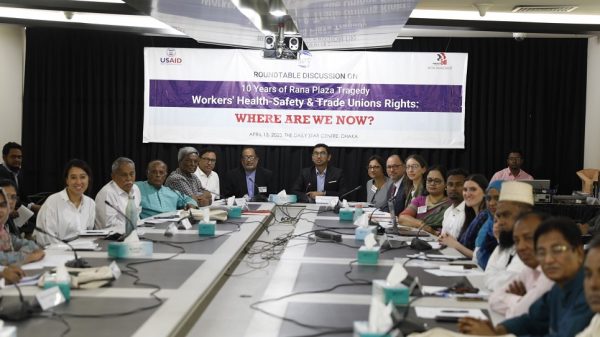Stakeholders must be accountable for workplace safety, labor rights: US envoy

Shawdesh desk:
The United States has recognised that positive changes, particularly in the RMG export sector in Bangladesh, have been occurred because of the tireless efforts
“Today, garment factories are safer due to agreements among unions, global brands, and employers who worked together under the former Accord and Alliance,” said US Ambassador Peter Haas at stakeholders’ roundtable on Thursday (April 13) to commemorate the 10th Anniversary of the Rana Plaza Tragedy.
The Government of Bangladesh has also done important work in the last decade to build a stronger body of labor laws and policies, he added.
Honouring the memory of those workers by reimagining a Bangladesh with safer working conditions, he said greater rights for workers, and increased accountability among all stakeholders—governments, brands, manufacturers, suppliers, consumers, workers, and trade unions have changed over the past ten years.
“We are also here to talk about where more work remains to be done, not only in the garment sector, but throughout the entire economy.”
Rana Plaza drew the world’s attention to unsafe conditions for Bangladesh’s factory workers and raised important questions around safety and transparency in the global garment industry. Workers stood in solidarity and said, “enough is enough” and the world agreed that such an accident should never happen again.
Highlighting the achievements in past one decade, the UN Ambassador said Bangladesh has digitised the trade union registration process, which should help workers form unions and complete their registrations in a timely fashion. They have also digitised the labour inspection system to improve data accessibility and transparency.
“This is tremendous progress. But it is nowhere near enough. As Bangladesh moves to graduate from LDC status, more will be expected of it,” Peter Hass said adding “Not only that, but in order to become a SMART, developed Bangladesh by 2024, workers safety and labor rights will need to become ingrained in Bangladesh’s ethos.”
In that regard, the US envoy put forward three areas where Bangladesh might focus going forward.
First, he said “we recognise the progress that Bangladesh has made. At the same time, I want to highlight the need for greater progress in industrial safety beyond the export-oriented RMG sector.”
Just last week, he said there was a massive fire at the popular Bangabazar clothing market in Dhaka that destroyed several thousand shops. This left a terrible mark on thousands of families, shattering their livelihoods.
Ambassador Haas said this was not an isolated incident and we are all aware of the recent explosion at the Seema Oxygen Plant, the fire at a container depot in Chittagong, and the Hashem food factory fire.
“These examples illustrate the need for stronger inspections and enforcement of labor laws across all industries and sectors,” he said and added that health and safety standards must protect everyone no matter where their products end up, and no matter where they work.
Second, the US envoy said Bangladesh should further strengthen the right of workers to form and join independent trade unions and to collectively bargain for better working conditions. The rights to freedom of association and collective bargaining are enabling rights for the realization of all other labor rights.
Around the world, he said unscrupulous employers will inevitably cut corners on safety, resulting in preventable worker injuries and deaths. “We know that when workers can form or join independent unions, they can defend their rights and collectively advance their interests”.
In fact, the decrease in work-related accidents in the industrialised world is largely due to the courageous efforts of organised labor, he observed.
Laying emphasis on trade union, Peter Haas said unionised workers are empowered to negotiate conditions more equally with employers to demand better wages and challenge unsafe working conditions.
“Unions also play a key role in advancing democratic values at the workplace. Workers must also have access to remedies for labor and safety violations,” he said and added that collective bargaining agreements can protect workers who refuse precarious work assignments or confront management on health and safety concerns.
Third, according to Peter Haas all stakeholders must be held accountable for workplace safety and labor rights.
“Improving occupational safety and health and labor rights is a shared responsibility. Government, manufacturers, brands, buyers, workers, unions, and consumers each have a crucial role to play to make sure that goods are produced safely and that everyone in the process earns a fair return.”
The US envoy said governments must play their critical role of developing strong labor protections and ensuring that they are respected. Manufacturers must make it a priority to keep their workers safe and to find ways to collaborate with their workforce. He also said international brands and buyers must do more to demand that labor rights are respected throughout their supply chains. This means adopting purchasing and pricing practices that support a living wage and promote high labor standards among their suppliers.
“Workers and their unions must advocate for their rights transparently and peacefully. And consumers must be mindful of the working conditions of the people who make the products they buy.”























Leave a Reply